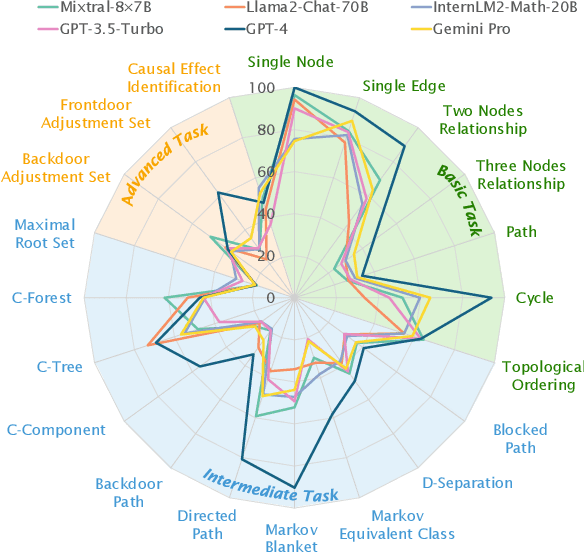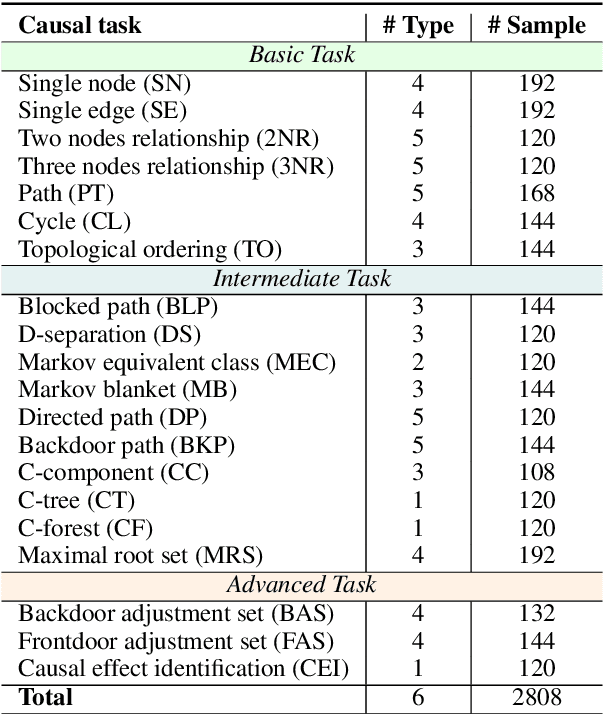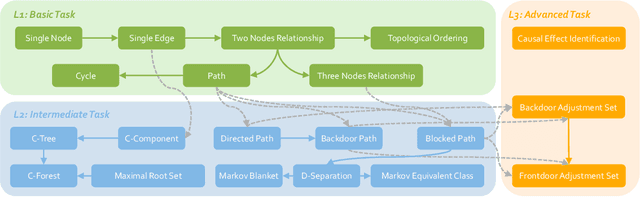Mengying Xu
CLEAR: Can Language Models Really Understand Causal Graphs?
Jun 24, 2024



Abstract:Causal reasoning is a cornerstone of how humans interpret the world. To model and reason about causality, causal graphs offer a concise yet effective solution. Given the impressive advancements in language models, a crucial question arises: can they really understand causal graphs? To this end, we pioneer an investigation into language models' understanding of causal graphs. Specifically, we develop a framework to define causal graph understanding, by assessing language models' behaviors through four practical criteria derived from diverse disciplines (e.g., philosophy and psychology). We then develop CLEAR, a novel benchmark that defines three complexity levels and encompasses 20 causal graph-based tasks across these levels. Finally, based on our framework and benchmark, we conduct extensive experiments on six leading language models and summarize five empirical findings. Our results indicate that while language models demonstrate a preliminary understanding of causal graphs, significant potential for improvement remains. Our project website is at https://github.com/OpenCausaLab/CLEAR.
Causal Evaluation of Language Models
May 01, 2024Abstract:Causal reasoning is viewed as crucial for achieving human-level machine intelligence. Recent advances in language models have expanded the horizons of artificial intelligence across various domains, sparking inquiries into their potential for causal reasoning. In this work, we introduce Causal evaluation of Language Models (CaLM), which, to the best of our knowledge, is the first comprehensive benchmark for evaluating the causal reasoning capabilities of language models. First, we propose the CaLM framework, which establishes a foundational taxonomy consisting of four modules: causal target (i.e., what to evaluate), adaptation (i.e., how to obtain the results), metric (i.e., how to measure the results), and error (i.e., how to analyze the bad results). This taxonomy defines a broad evaluation design space while systematically selecting criteria and priorities. Second, we compose the CaLM dataset, comprising 126,334 data samples, to provide curated sets of causal targets, adaptations, metrics, and errors, offering extensive coverage for diverse research pursuits. Third, we conduct an extensive evaluation of 28 leading language models on a core set of 92 causal targets, 9 adaptations, 7 metrics, and 12 error types. Fourth, we perform detailed analyses of the evaluation results across various dimensions (e.g., adaptation, scale). Fifth, we present 50 high-level empirical findings across 9 dimensions (e.g., model), providing valuable guidance for future language model development. Finally, we develop a multifaceted platform, including a website, leaderboards, datasets, and toolkits, to support scalable and adaptable assessments. We envision CaLM as an ever-evolving benchmark for the community, systematically updated with new causal targets, adaptations, models, metrics, and error types to reflect ongoing research advancements. Project website is at https://opencausalab.github.io/CaLM.
 Add to Chrome
Add to Chrome Add to Firefox
Add to Firefox Add to Edge
Add to Edge